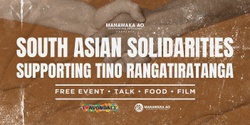South Asian Solidarities, supporting Tino Rangatiratanga
Event description
NOW more than ever, given the current colonial mishandling of Te Tiriti we are witnessing, it's critical that we, as diverse communities, step up and ask ourselves what day-to-day ACTIONS we can engage in (beyond the words, beyond the pōwhiri, beyond attending a Te Tiriti workshop) to support Tangata Whenua.
As a follow up to our last in person solidarities event where we engaged in conversation with our Ethnic communities more broadly along with Tangata Whenua, we continue the theme of solidarities, this time with our South Asian diaspora who form well over a quarter of a million folk here in Aotearoa. Some of the themes we will reflect on are how colonisation has impacted us, whether we know enough about our own histories, and what solidarities look like across South Asian communities. Would exploring some of these themes support us to strengthen our understanding and responsibilities to Tangata whenua?
Introducing our wonderful panelists
Aaisha Khan is the founder and curator of Girmit Diaries.Born and raised in Aotearoa, New Zealand, Aaisha has always felt a strong affinity to her motherland, Fiji and is passionate about researching about her Indo Fijian heritage and providing her community with a (virtual) safe space, a libray of sorts where they can learn more about their roots.
Mohan Dutta is Bengali Hindu. His ancestors lived through the violence of colonialism, the Bengal famine, and the partition, and resisted at every step. Mohan is Dean’s Chair Professor of Communication at Massey University. He is the Director of the Center for Culture-Centered Approach to Research and Evaluation (CARE), developing culturally-centered, community-based projects of social change anchored in decolonisation and racial justice. Mohan’s research examines the role of advocacy and activism in challenging marginalising structures, and the ways in which participatory culture-centered processes and strategies of radical democracy serve as axes of global social change. A thread of the work on Indigeneous-migrant solidarities seeks to co-create voice infrastructures at the “margins of the margins” resisting racial capitalism.
Nishhza Thiruselvam is a Malaysian born Tamil with ancestry tracing back to Jaffna, Sri Lanka and Thanjavur in India’s southernmost state of Tamil Nadu. She is a writer and a high school teacher in South Auckland. Nishhza grounds her teaching practice in solidarity with her indigenous Pacific students and their communities, understanding all struggles for liberation as interconnected.
Bilal Nasier has called Aotearoa home since arriving from Afghanistan in 1999 as an asylum seeker. Very recently, he completed his training in Clinical Psychology at the University of Auckland and currently practices out of a South Auckland clinic for children and adolescents. In his doctoral thesis, Bilal explored how Muslim youth experienced and responded to the March 15th terrorist attacks. With a particular interest in the intersection of racism and the psychological wellbeing of minoritised peoples, Bilal hopes to contribute towards building an Aotearoa where youth can thrive and live fulfilling lives.
Ara Alam-Simmons is daughter of Bangladeshi migrants, who was born and raised in the Uk and now living in Aotearoa. Ara is founder of Manawaka Ao, an intentional community space that crafts healing experiences for both women of colour and wider community to come together through creative art, and connection to strengthen relationships and to understand our responsibilities as people of Te Tiriti. She is also completing her PhD as part of the working to end racial oppression project in the school of Māori and Indigenous studies at Waikato University. She has a particular interest in South Asian - Māori solidarities. Ara is also an educator, occasional writer, and actively involved across various diverse communities.
If you think I don’t identify as South Asian, this event can’t be for me; we would say this event is for everyone, which includes our supporters and allies. We have much to learn from each other and who knows, it may spark action in you wanting to hold a similar conversation with those that form part of the communities you belong to.
Our time together will be
10.30am - doors open
11 am start
90-minute discussion with our community panelists
Light refreshments will be available on-site.
Followed by the screening of MURU. The film, which first screened in 2022, is inspired by true events where in 2007, New Zealand police engaged in raids against the Ngāi Tūhoe community of Rūātoki.
This event is a labour of love and speaks to our responsibilities in building community and creating spaces where we can also hold ourselves accountable to each other, as we continue to live on this whenua (land).
We would love you to join us and share with your friends and whānau.
This event is bought to you by I Love Avondale and Manawaka Ao, together with the generous support of our communities
Whānau community and centre hub, Adikhaar Aotearoa, Creative Unlimited Collective, NZ Ethnic Women's Trust,
This is a free event, however, if you can support us with any koha, no matter how small towards our costs, this would be greatly appreciated.

